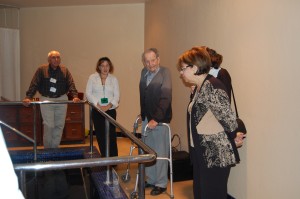Written by Rabbi Scott Rosenberg
For me, there is something extremely humbling about immersion in a mikveh. The idea of mikveh and the transcendent powers of mayyim hayyim, living waters, have always evoked within me a sense of reverence and awe. The link to creation, the notion of rebirth, the existential tension between purity and impurity and the sacred reminder of our partnership with God in all that we undertake, combine in a moment to reinvigorate one’s soul.
Every kosher mikveh is filled with transformative water that is deemed purifying by our centuries old halachic (legal) tradition. Every kosher mikveh is constructed following these rigorous legal standards and is rabbinically supervised, throughout its operation, to make sure these very standards are upheld. When Mayyim Hayyim opened its doors in 2004, I was asked and accepted the sacred responsibility of serving as the Rav HaMachshir, the Rabbi supervising the kashrut of this very special mikveh. My teacher, Rabbi Ben Zion Bergman, had worked with the visionary leaders in our community to oversee the construction of Mayyim Hayyim’s sacred pools. Now operating, the waters require ongoing Rabbinic supervision. For over seven years, it was my honor to fill this role. Working with the wonderful staff at Mayyim Hayyim, we maintained a kosher mikveh.
When I was asked to participate, along with Rabbi Ben Zion Bergman, Rabbi Aaron Alexander and Carrie Bornstein in presenting a workshop on mikveh construction and supervision to colleagues and other interested parties, I was glad to share my experience and knowledge. For two days in November, we gathered at the American Jewish University and studied together. We deepened our understanding of the insight of our sages and looked at the practical implications of their wisdom on the construction and maintenance of contemporary mikvaot.
As one of the conference instructors, I was excited by th e level of commitment and desire to master the subject matter evidenced by all the participants. I was inspired by the value each and every one of us placed on mikveh and its critical role in contemporary Jewish life. I felt privileged to be part of a larger group of communal leaders who were now knowledgeable about the construction and maintenance of mikvaot. I know that together, we will continue to work diligently to bring the value of living water, of Mayyim Hayyim to those who seeks its sacred power.
e level of commitment and desire to master the subject matter evidenced by all the participants. I was inspired by the value each and every one of us placed on mikveh and its critical role in contemporary Jewish life. I felt privileged to be part of a larger group of communal leaders who were now knowledgeable about the construction and maintenance of mikvaot. I know that together, we will continue to work diligently to bring the value of living water, of Mayyim Hayyim to those who seeks its sacred power.
Thank you to Amy Chartock, Carrie Bornstein and all of the leaders of Mayyim Hayyim for affording this wonderful opportunity to all Rabbis and teachers in North America.
Rabbi Scott Rosenberg is the senior rabbi at Congregation Beth Shalom in Ottowa, Canada where he has been since August 2010. Prior to this, Rabbi Rosenberg was the spiritual leader of Temple Reyim in Newton, Massachusetts from 1988-2010. During his time at Temple Reyim, Rabbi Rosenberg served as the Rav Hamachshir for Mayyim Hayyim Living Waters Community Mikveh and Paula Brody and Family Education Center. A native of Brooklyn, New York, Rabbi Rosenberg earned Bachelor’s degrees from both Columbia University and the Jewish Theological Seminary in 1980. In 1983 he earned his Master’s of Arts degree from the Jewish Theological Seminary and was ordained by the Seminary in 1984. While serving his first congregation in Houston, Texas, Rabbi Rosenberg continued his rabbinic studies and in November 1988 was certified as a Mesader Gitten (specialist in Jewish divorce law) by the Joint Bet Din (Rabbinic Court) of the Rabbinical Assembly. He served as the head of the Rabbinical Assembly of New England’s Rabbinic Court for matters pertaining to Jewish family law. In 2003 he was appointed to serve as a member of the Joint Bet Din of the Conservative Movement.


